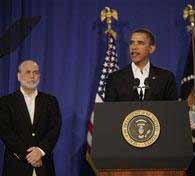The Fed chief faces the job of having to pull back government aid and raise interest rates. But if he acts too soon, it could crush a recovery.
This is the VOA Special English Economics Report.
The government says the United States economy shrank at an annual rate of one percent in April, May and June. The decrease was less than expected, and much less than at the start of the year. The improvement was partly the result of increased government spending.
Another report on Thursday showed a small drop in the number of newly jobless workers last week. There was also a drop in the number of people on long-term unemployment assistance.

On Tuesday, President Obama nominated Ben Bernanke for a second term as chairman of the Federal Reserve. His current four years end in January.
BARACK OBAMA: "Ben approached a financial system on the verge of collapse with calm and wisdom, with bold action and out-of-the-box thinking that has helped put the brakes on our economic freefall."
Ben Bernanke led the central bank through extraordinary efforts to contain the worst economic crisis since the 1930s. But economists say it may still be too early to congratulate him on rescuing the economy.
He is an expert on the causes of the Great Depression. Yet critics say he failed to do his part to prevent the crisis.
He has critics in both parties. Democrat Chris Dodd, chairman of the Senate Banking Committee, says Ben Bernanke did not act fast enough at the start. And many Republicans criticize the Fed chief -- himself a Republican -- for what they see as too much spending.
He used the bank's power to create money. The Fed established new lending programs, and approved large purchases of government securities and mortgage-related securities.
But the president's decision to renominate Ben Bernanke for Senate confirmation is considered a safe one. In his second term, he will have to consider how and when to withdraw heavy intervention in the financial industry and raise interest rates. The Fed has reduced short-term rates to almost zero.
Heavy government spending could cause inflation unless officials find just the right time to act. But if they act too soon and raise interest rates too much, the economy could crash again.
The White House budget office on Tuesday lowered its estimate for this year's federal deficit. The government will probably spend less than it thought on the financial system.
The estimate for the next ten years, however, is higher because the recession was deeper than expected. But even after the economy recovers, the deficit is around four percent of the economy. And that, as the report notes, is "higher than desirable."
And that's the VOA Special English Economics Report, written by Mario Ritter. Transcripts and podcasts of our reports are at voaspecialenglish.com. I'm Steve Ember.
out-of-the-box thinking: thinking that moves away in diverging directions so as to involve a variety of aspects and which sometimes lead to novel ideas and solutions; associated with creativity 創造性思維
put the brakes on:阻止
Related stories:
US economy slowly improving, challenges remain
Central bank chief sees US economic weakness continuing
Paulson, Bernanke defend financial rescue strategy
Another stimulus bill gains momentum
(Source: VOA 英語點津編輯)